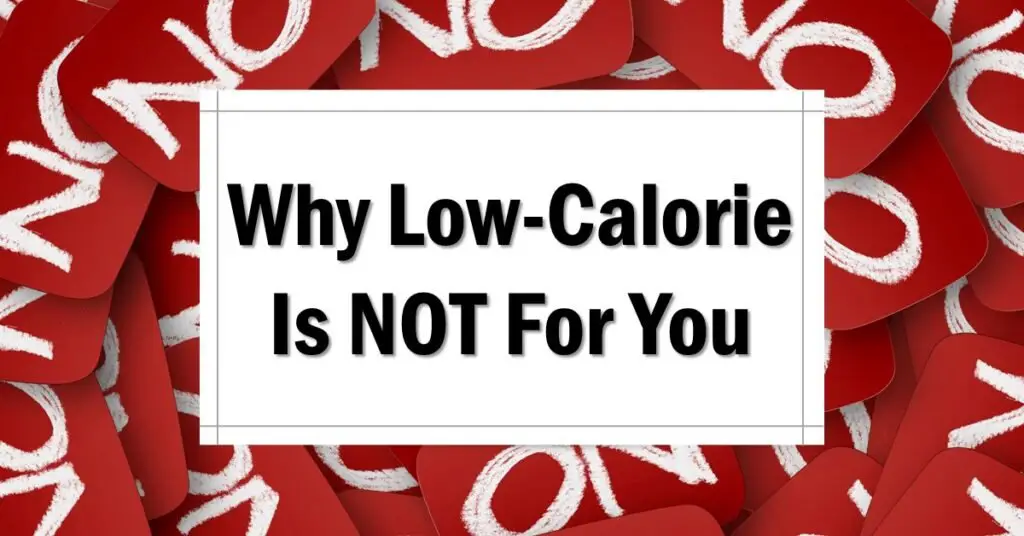Do you think that eating fewer calories is the way to long-term health and weight loss? Well, you may be wrong. Low calorie diets are often portrayed as a miracle cure for obesity, but they can come with many unintended consequences. In this article, we’ll look at why a low calorie diet isn’t for everyone, and what to do instead if you’re trying to stay healthy and lose weight. If low-calorie diets are not for you (my hand is up!), keto may be the answer.
Disclosure: Some of the links in this article may be affiliate links, meaning that we may earn a small commission if you click through using our link and make a purchase. Please be assured that this will not cost you any extra money. Also, please be assured that we either use the products we recommend personally, or have been recommended by trusted friends who currently use them.
Stats and Info
1. Low calorie diets are typically defined as those that provide 800 to 1,200 calories per day.
2. A low calorie diet can lead to rapid weight loss, but it’s not sustainable in the long term.
3. Very low calorie diets (VLCDs) of fewer than 800 calories per day may be dangerous and should only be used under medical supervision.
4. Low calorie diets can cause feelings of hunger and deprivation, which can lead to binging and overeating.
5. Low calorie diets can also cause fatigue, irritability, and other health issues.
6. Low calorie diets may cause muscle loss and slowed metabolism, which can make it harder to maintain weight loss in the long term.
7. A low calorie diet may also result in nutritional deficiencies if not balanced with the right foods.
8. It’s important to focus on healthy eating and lifestyle changes rather than just cutting calories in order to maintain a healthy weight.

If you are looking to lose weight, you may have considered a low calorie diet. However, this type of diet can have some serious drawbacks.
Firstly, it can lead to nutrient deficiencies, as it requires cutting out entire food groups, or restricting portions of essential nutrients. This can lead to fatigue, muscle loss, and other health issues.
Secondly, it can be difficult to stick to in the long run. People on a low calorie diet may be prone to feeling deprived or unsatisfied with their meals, leading to cravings and unhealthy snacking.
To avoid these problems, it’s important to focus on a nutritious diet. Try to include a variety of healthy foods, like lean proteins, fruits and vegetables, and healthy fats.
Additionally, make sure you are getting enough calories to fuel your activities and help keep your metabolism up.
Finally, if you are struggling to stay on track, try to find support from friends, family, or a registered dietitian. If none of them are for you, you could join The Keto Eater’s Facebook community, or one of the many other amazing, supporting communities out there.
Why Restricting Calories is Not the Answer to Long-Term Weight Loss
When it comes to losing weight, it can be tempting to opt for a low calorie diet in the hopes of quickly seeing results.
Sadly, this type of diet is not a long-term solution and can even be detrimental to your health.
Low calorie diets are often restrictive and difficult to maintain, meaning that the results you see may not be sustainable. Furthermore, cutting calories too drastically can cause hormonal imbalances that can lead to other health issues.
It is true that reducing calorie intake can lead to weight loss, however, it is not the healthiest way to achieve this. Eating too few calories can cause your metabolism to slow down, meaning that your body starts to conserve energy rather than burn it.
As your metabolism slows down, it becomes increasingly difficult to lose weight.

This can make it even more difficult to lose weight in the long run. Low calorie diets can also lead to feelings of deprivation, which can lead to binging on unhealthy food once the diet is over.
It can also build an unhealthy relationship with food as you may start to resent calorific, tasty foods. Having an unhealthy relationship with food can be very dangerous and can lead to eating disorders.
Rather than opting for a low calorie diet, it is important to focus on eating a healthy, diet that is rich in nutrients.
Consuming the right amount of calories in combination with regular exercise can help you to reach a healthy weight in a sustainable way, keto can help you achieve this, whilst eating nutritious, full-flavored foods.
Eating a nutritious diet will also ensure that your body is getting the vitamins and minerals it needs to function properly.
By focusing on eating the right foods and maintaining a healthy lifestyle, it is possible to reach your goals without sacrificing your health.
What Are Your Thoughts: Low Calorie Vs Keto?
So what are your thoughts, is a low carb diet for you? Or are you going to become a keto eater?


![Can You Eat A Vegan Keto Diet [Everything You Need To Know] 4 Can you eat a vegan keto diet](https://theketoeater.com/wp-content/uploads/2023/01/Can-you-eat-a-vegan-keto-diet-150x150.jpg)